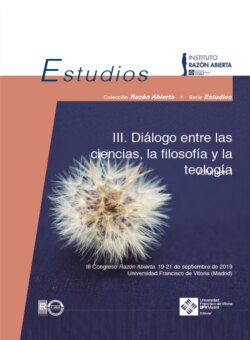III Diálogo entre las ciencias, la filosofía y la teología. Volumen I

Реклама. ООО «ЛитРес», ИНН: 7719571260.
Оглавление
María Lacalle. III Diálogo entre las ciencias, la filosofía y la teología. Volumen I
Отрывок из книги
Una mirada naturalista, tan frecuente hoy en día, considera que solo es científico lo que sigue el método empírico. Y, así, nos encontramos con que las preguntas por lo propiamente humano —el origen y el fin de todas las cosas, su sentido, el bien y el mal— no encuentran espacio en esa noción reducida de ciencia y quedan desplazadas al ámbito de lo subjetivo y lo opinable. Por eso Benedicto XVI, en el discurso pronunciado en la Universidad de Ratisbona, pedía un ensanchamiento de la razón que nos permita superar la limitación que la ciencia se impone a sí misma al reducirse a lo que se puede verificar con la experimentación, de manera que volvamos a abrir los horizontes de la razón en toda su amplitud.
La Universidad Francisco de Vitoria y la Fundación Joseph Ratzinger convocan anualmente los Premios Razón Abierta con el objetivo de reconocer aquellos trabajos de investigación y de innovación docente realizados desde una razón ampliada, como propone Benedicto XVI. También organizan cada año un congreso internacional en el que profesores e investigadores de todo el mundo y de todas las áreas de conocimiento se encuentran y comparten avances, dificultades y propuestas para una transformación del quehacer universitario partiendo del ensanchamiento de la razón.
.....
Physical reality cannot account for its own existence for the simple reason that nature – the physical – is that which by definition already exists; existence, even taken as a simple brute fact to which no metaphysical theory is attached, lies logically beyond the stream of causes that nature comprises; it is, quite literally, «hyperphysical,» or shifting into Latin, super naturam. This means not only that at some point nature requires or admits of a supernatural explanation (which it does), but also that at no point is anything purely, self-sufficiently natural in the first place.18
In other words, «there simply cannot be a natural explanation of existence as such; it is an absolute logical impossibility» (44). Efforts such as Krauss’s imply that the closer we get temporally to the Big Bang in our physical explanation about the universe, or the simpler are the physical states and natural laws out of which the universe developed, the closer the natural sciences get to «explaining everything.» But such attempts overlook the total irrelevance of their findings for the question of ontological contingency: «no purely physical cosmology has any bearing whatsoever upon the question of existence... and so it is immaterial here how small, simple, vacuous, or impalpably indeterminate a physical state or event is: it is still infinitely removed from non-being and infinitely incapable of having created itself out of nothing» (97). Again, it is extremely interesting and indeed dumbfounding that the cosmically elaborated universe in which we live today seems to have developed as it has from such extremely few initial natural conditions and states, and anyone who cares about knowledge ought to be grateful for the remarkable experimental and theoretical work physicists have done to disclose the mind-blowing character of our universe, intellectual labor that remains ongoing. But reducing everything to its most basic, original conditions and constituents at the moment of the Big Bang, and thinking that thereby one has arrived at a sort of ontological «ground zero» of nothingness, simply broadcasts, with an embarrassing lack of self-awareness, one’s incomprehension of what the contingency of existence means. «In fact,» Hart writes, «one will be starting no nearer to nonbeing than if one were to begin with an infinitely realized multiverse: the difference from non-being remains infinite in either case» (98). To see this is to understand the point at issue.
.....